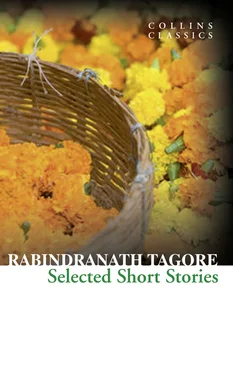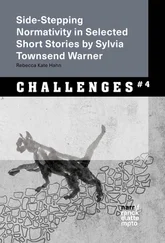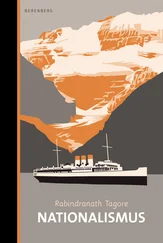On a charge of murderous assault, Rahmun was sentenced to some years’ imprisonment.
Time passed away and he was not remembered. The accustomed work in the accustomed place was ours, and the thought of the once free mountaineer spending his years in prison seldom or never occurred to us. Even my light-hearted Mini, I am ashamed to say, forgot her old friend. New companions filled her life. As she grew older, she spent more of her time with girls. So much time indeed did she spend with them that she came no more, as she used to do, to her father’s room. I was scarcely on speaking terms with her.
Years had passed away. It was once more autumn and we had made arrangements for our Mini’s marriage. It was to take place during the Puja Holidays. With Durga returning to Kailas, the light of our home also was to depart to her husband’s house, and leave her father’s in the shadow.
The morning was bright. After the rains, there was a sense of ablution in the air, and the sun-rays looked like pure gold. So bright were they, that they gave a beautiful radiance even to the sordid brick walls of our Calcutta lanes. Since early dawn that day the wedding-pipes had been sounding, and at each beat my own heart throbbed. The wail of the tune, Bhairavi, seemed to intensify my pain at the approaching separation. My Mini was to be married that night.
From early morning noise and bustle had pervaded the house. In the courtyard the canopy had to be slung on its bamboo poles; the chandeliers with their tinkling sound must be hung in each room and verandah. There was no end of hurry and excitement. I was sitting in my study, looking through the accounts, when someone entered, saluting respectfully, and stood before me. It was Rahmun the Cabuliwallah. At first I did not recognise him. He had no bag, nor the long hair, nor the same vigour that he used to have. But he smiled, and I knew him again.
“When did you come, Rahmun?” I asked him.
“Last evening,” he said, “I was released from jail.”
The words struck harsh upon my ears. I had never before talked with one who had wounded his fellow, and my heart shrank within itself when I realised this; for I felt that the day would have been better-omened had he not turned up.
“There are ceremonies going on,” I said, “and I am busy. Could you perhaps come another day?”
At once he turned to go; but as he reached the door he hesitated, and said: “May I not see the little one, sir, for a moment?” It was his belief that Mini was still the same. He had pictured her running to him as she used, calling “O Cabuliwallah! Cabuliwallah!” He had imagined too that they would laugh and talk together, just as of old. In fact, in memory of former days he had brought, carefully wrapped up in paper, a few almonds and raisins and grapes, obtained somehow from a countryman; for his own little fund was dispersed.
I said again: “There is a ceremony in the house, and you will not be able to see any one to-day.”
The man’s face fell. He looked wistfully at me for a moment, then said “Good morning,” and went out.
I felt a little sorry, and would have called him back, but I found he was returning of his own accord. He came close up to me holding out his offerings with the words: “I brought these few things, sir, for the little one. Will you give them to her?”
I took them and was going to pay him, but he caught my hand and said: “You are very kind, sir! Keep me in your recollection. Do not offer me money!—You have a little girl: I too have one like her in my own home. I think of her, and bring fruits to your child—not to make a profit for myself.”
Saying this, he put his hand inside his big loose robe, and brought out a small and dirty piece of paper. With great care he unfolded this, and smoothed it out with both hands on my table. It bore the impression of a little hand. Not a photograph. Not a drawing. The impression of an ink-smeared hand laid flat on the paper. This touch of his own little daughter had been always on his heart, as he had come year after year to Calcutta to sell his wares in the streets.
Tears came to my eyes. I forgot that he was a poor Cabuli fruit-seller, while I was—. But no, what was I more than he? He also was a father.
That impression of the hand of his little Pārbati in her distant mountain home reminded me of my own little Mini.
I sent for Mini immediately from the inner apartment. Many difficulties were raised, but I would not listen. Clad in the red silk of her wedding-day, with the sandal paste on her forehead, and adorned as a young bride, Mini came, and stood bashfully before me.
The Cabuliwallah looked a little staggered at the apparition. He could not revive their old friendship. At last he smiled and said: “Little one, are you going to your father-in-law’s house?”
But Mini now understood the meaning of the word “father-in-law,” and she could not reply to him as of old. She flushed up at the question, and stood before him with her bride-like face turned down.
I remembered the day when the Cabuliwallah and my Mini had first met, and I felt sad. When she had gone, Rahmun heaved a deep sigh, and sat down on the floor. The idea had suddenly come to him that his daughter too must have grown in this long time, and that he would have to make friends with her anew. Assuredly he would not find her as he used to know her. And besides, what might not have happened to her in these eight years?
The marriage-pipes sounded, and the mild autumn sun streamed round us. But Rahmun sat in the little Calcutta lane, and saw before him the barren mountains of Afghanistan.
I took out a banknote and gave it to him, saying: “Go back to your own daughter, Rahmun, in your own country, and may the happiness of your meeting bring good fortune to my child!”
Having made this present, I had to curtail some of the festivities. I could not have the electric lights I had intended, nor the military band, and the ladies of the house were despondent at it. But to me the wedding-feast was all the brighter for the thought that in a distant land a long-lost father met again with his only child.
Phatik Chakravorti was ringleader among the boys of the village. A new mischief got into his head. There was a heavy log lying on the mud-flat of the river waiting to be shaped into a mast for a boat. He decided that they should all work together to shift the log by main force from its place and roll it away. The owner of the log would be angry and surprised, and they would all enjoy the fun. Everyone seconded the proposal, and it was carried unanimously.
But just as the fun was about to begin, Mākhan, Phatik’s younger brother, sauntered up and sat down on the log in front of them all without a word. The boys were puzzled for a moment. He was pushed, rather timidly, by one of the boys and told to get up; but he remained quite unconcerned. He appeared like a young philosopher meditating on the futility of games. Phatik was furious. “Mākhan,” he cried, “if you don’t get down this minute I’ll thrash you!”
Mākhan only moved to a more comfortable position.
Now, if Phatik was to keep his regal dignity before the public, it was clear he ought to carry out his threat. But his courage failed him at the crisis. His fertile brain, however, rapidly seized upon a new manœuvre which would discomfit his brother and afford his followers an added amusement. He gave the word of command to roll the log and Mākhan over together. Mākhan heard the order and made it a point of honour to stick on. But he overlooked the fact, like those who attempt earthly fame in other matters, that there was peril in it.
The boys began to heave at the log with all their might, calling out, “One, two, three, go!” At the word “go” the log went; and with it went Mākhan’s philosophy, glory and all.
Читать дальше












